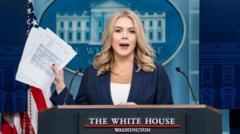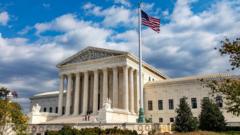The decision emphasizes the First Amendment rights of the press, countering government attempts to restrict media access based on content disagreements.
U.S. Court Rules in Favor of AP Journalists, Challenges White House Restrictions

U.S. Court Rules in Favor of AP Journalists, Challenges White House Restrictions
A federal judge orders the Trump administration to reinstate access for Associated Press journalists to presidential events after a dispute over the renaming of the Gulf of Mexico.
In a landmark ruling on First Amendment rights, U.S. District Judge Trevor McFadden has mandated that the Trump administration restore Associated Press (AP) journalists' access to presidential events. This judgment follows a White House blockade due to the AP's refusal to adopt the administration's controversial renaming of the Gulf of Mexico to the "Gulf of America."
Judge McFadden's ruling underscores the principle that freedom of speech must be upheld, informing the administration that it cannot selectively allow access to journalists based on their viewpoints. He stressed that the government must maintain equal access to press events for all, thereby reinforcing the constitutional rights guaranteed to journalists. The case arose when the AP challenged the accessibility restrictions imposed by the administration after disputing the new terminology set forth in an executive order signed by President Donald Trump.
The AP's spokesperson welcomed the ruling, viewing it as a reaffirmation of press freedoms that protect against retaliation by government officials. The ruling received support from various organizations advocating for free speech, including the Knight First Amendment Institute, which described the initial restrictions as "retaliatory" and unconstitutional.
The Trump administration’s defense established that the AP was not entitled to "special access" to presidential events. However, the court's ruling diminishes that argument, suggesting that any restriction could lead to a dangerous precedent regarding media freedoms. The AP has maintained its commitment to using the original terminology, highlighting that they will continue their journalistic practices despite the administration's assertions.
As the implementation of this ruling is temporarily paused to allow for an appeal, the ongoing tensions between the Trump administration and media entities underscore the broader challenges facing press freedom in the U.S.
Following this ruling, the AP and other press organizations are expected to closely monitor changes in access and language policies, marking a critical moment for journalistic autonomy in the nation.
Judge McFadden's ruling underscores the principle that freedom of speech must be upheld, informing the administration that it cannot selectively allow access to journalists based on their viewpoints. He stressed that the government must maintain equal access to press events for all, thereby reinforcing the constitutional rights guaranteed to journalists. The case arose when the AP challenged the accessibility restrictions imposed by the administration after disputing the new terminology set forth in an executive order signed by President Donald Trump.
The AP's spokesperson welcomed the ruling, viewing it as a reaffirmation of press freedoms that protect against retaliation by government officials. The ruling received support from various organizations advocating for free speech, including the Knight First Amendment Institute, which described the initial restrictions as "retaliatory" and unconstitutional.
The Trump administration’s defense established that the AP was not entitled to "special access" to presidential events. However, the court's ruling diminishes that argument, suggesting that any restriction could lead to a dangerous precedent regarding media freedoms. The AP has maintained its commitment to using the original terminology, highlighting that they will continue their journalistic practices despite the administration's assertions.
As the implementation of this ruling is temporarily paused to allow for an appeal, the ongoing tensions between the Trump administration and media entities underscore the broader challenges facing press freedom in the U.S.
Following this ruling, the AP and other press organizations are expected to closely monitor changes in access and language policies, marking a critical moment for journalistic autonomy in the nation.






















